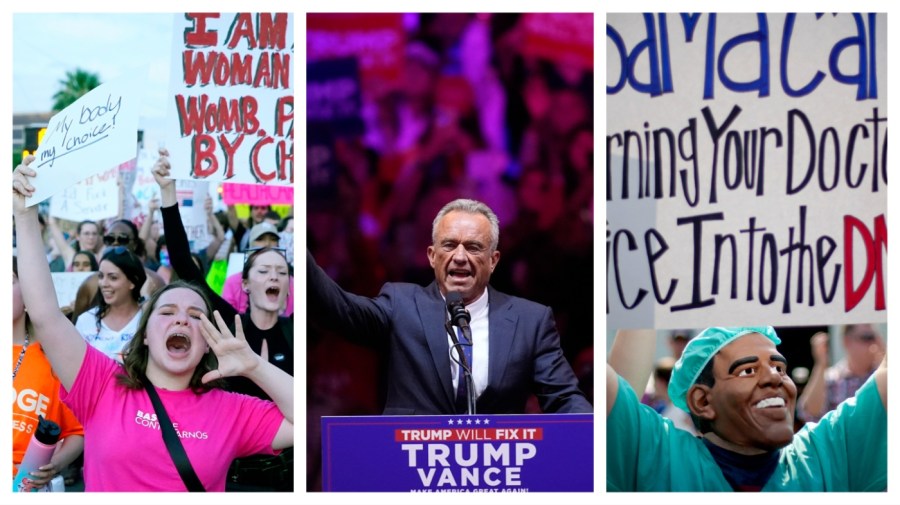Voters head to the polls Tuesday to cast ballots in an election with significant consequences for health care.
A victory for Vice President Harris will likely mean the continuation and strengthening of many of the Biden administration’s efforts to increase access to care and decrease costs.
A second Trump presidency could mean significant changes to the healthcare system, though Trump has been vague about his plans.
Much of what either candidate would be able to accomplish will depend on Congress, where Democrats face long odds to hold their razor-thin majority in the Senate and the House is considered essentially a tossup.
Here’s what to watch:
Abortion access
Throughout his entire campaign, Trump has repeatedly stated his belief that abortion should be left as a state issue. After some waffling, he stated he would be voting “no” on Florida’s ballot measure that would overturn the state’s current six-week ban, even though he has said he believes it to be too restrictive.
Harris has said restoring the protections of Roe v. Wade will be her “first priority” if she wins the election. She said she would push Congress to eliminate the filibuster to pass abortion protection legislation.
She has repeatedly said she would sign legislation passed by Congress to restore Roe v. Wade, which was overturned by the Supreme Court’s conservative majority in 2022. However, such a bill has little chance of getting through the Senate, even if Democrats have a slight majority.
The Biden-Harris administration has also enacted regulations aimed at increasing abortion access. A second Trump administration could undo those.
Abortion rights advocates are also wary that a Trump administration would try to enforce the Comstock Act, a 150-year-old law that could be used to stop the mailing of mifepristone, the medication used in a majority of abortions.
ObamaCare
The presidential election will also determine the fate of the Affordable Care Act (ACA). About 45 million Americans are enrolled in a health insurance program through the ACA, also called ObamaCare.
Harris has pledged to strengthen and expand the ACA including making the law’s temporary enhanced subsidies permanent. The subsidies, which expire next year, have made health plans affordable to a wide range of people and have even made some plans free.
Whether they are extended or not will be up to Congress. Democrats have already introduced bicameral bills to extend the subsidies permanently, but it’s likely something they won’t be able to achieve unless they control all three branches of government. Republicans have balked at the $300 billion price tag.
Trump has repeatedly said he wants to repeal the 14-year-old law and replace it with something better. His tone has shifted recently, as he’s tried to take credit for saving the law.
When asked during the presidential debate in September about whether he had a plan to replace Obamacare, Trump said he had “concepts of a plan.”
Trump did propose an ACA replacement plan in the 2020 budget which included repealing the ACA’s premium subsidies and Medicaid expansions, instead replacing them with block grants to states. In total, Trump’s 2020 plan would have reduced federal spending on the ACA and Medicaid by more than $1 trillion over 10 years, according to KFF.
As Speaker Mike Johnson (R-La.) noted at a recent campaign event, the law is too ingrained in the health system to be outright repealed. But a second Trump administration could still make major changes.
The first Trump administration for instance slashed funding for “navigators” — the outreach professionals who help people enroll in ACA plans. Trump’s running mate Sen. JD Vance (R-Ohio) has also talked about implementing a controversial high-risk pool system and deregulating the insurance markets.
Drug prices
Harris has proposed accelerating Medicare drug price negotiations, allowing the prices of more drugs to be brought down. She has also called for the $35 monthly cap on insulin and the $2,000 annual prescription cap for Medicare beneficiaries to include everyone.
The vice president also vowed to “demand transparency from the middlemen who operate between Big Pharma and the insurance companies who use opaque practices to raise your drug prices and profit off your need for medicine.”
Trump hasn’t offered many specifics in terms of how he would rein in prescription drug spending in a second term. In his first term, his administration focused on promoting price transparency, such as requiring hospitals to publish their prices and banning gag clauses that prevented pharmacists from disclosing cheaper options.
Trump signed an executive order ensuring Medicare wouldn’t pay more for physician-administered drugs than other developed countries — his Most Favored Nation Model — but that rule was rescinded under the Biden administration following a court order to halt it.
It remains unclear if he would bring this policy back, but experts and lawmakers have been receptive to the idea. Trump also prioritized cracking down on pharmacy benefit managers, something that could draw bipartisan support.
RFK Jr.
Public health has received increased focus on the campaign trail since Trump brought Robert F. Kennedy Jr. into the mix, along with the former independent candidate’s proposals to drastically alter the U.S. health landscape.
Trump has pledged to let Kennedy “go wild on health,” stoking fears from public health experts and officials. The Trump campaign has said Kennedy would have a strong influence over the health policy of a second Trump administration, in some yet-to-be-specified role.
Kennedy, an environmental lawyer with no health degree, is a prominent conspiracy theorist and vaccine skeptic. He has proposed banning vaccinations and removing fluoride from the water supply.
Trump has expressed some openness to these proposals, saying he’s going to “make a decision” on a vaccine ban and calling a removal of fluoride “OK to me.”
In response, Harris called Kennedy the “last person in America” who should be directing health policy.

